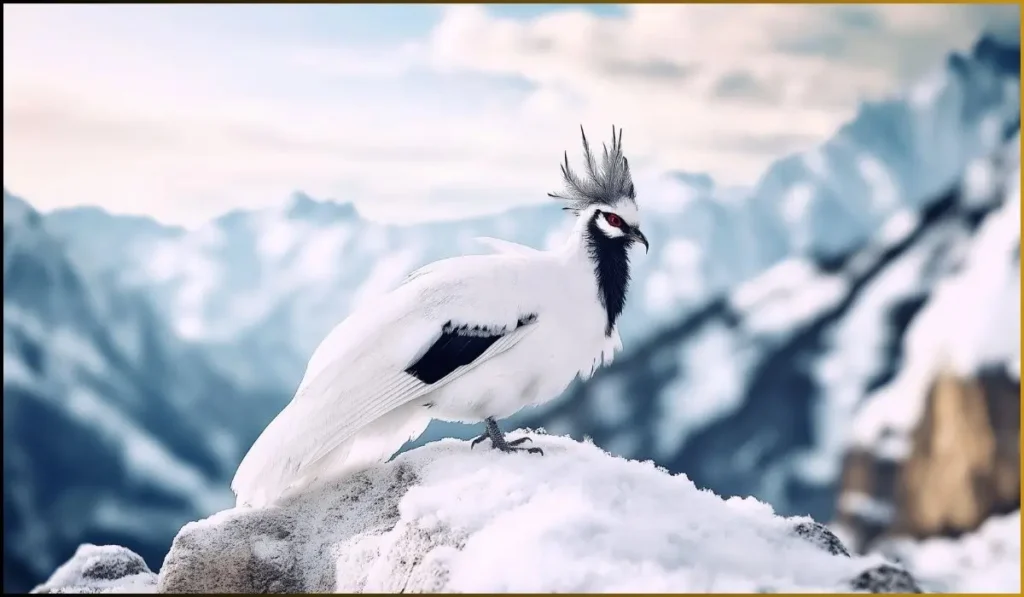Ladakh is a good range of homes for birds.
In Ladakh, many bird species live, some species you already know but some of the bird species you didn’t even hear of before.
So, Let’s dive into the blog post where we explore 5 beautiful black and white birds of Ladakh.
What kinds of black and white birds are found in Ladakh?
There are only 5 birds with black and white colors found in Ladakh.
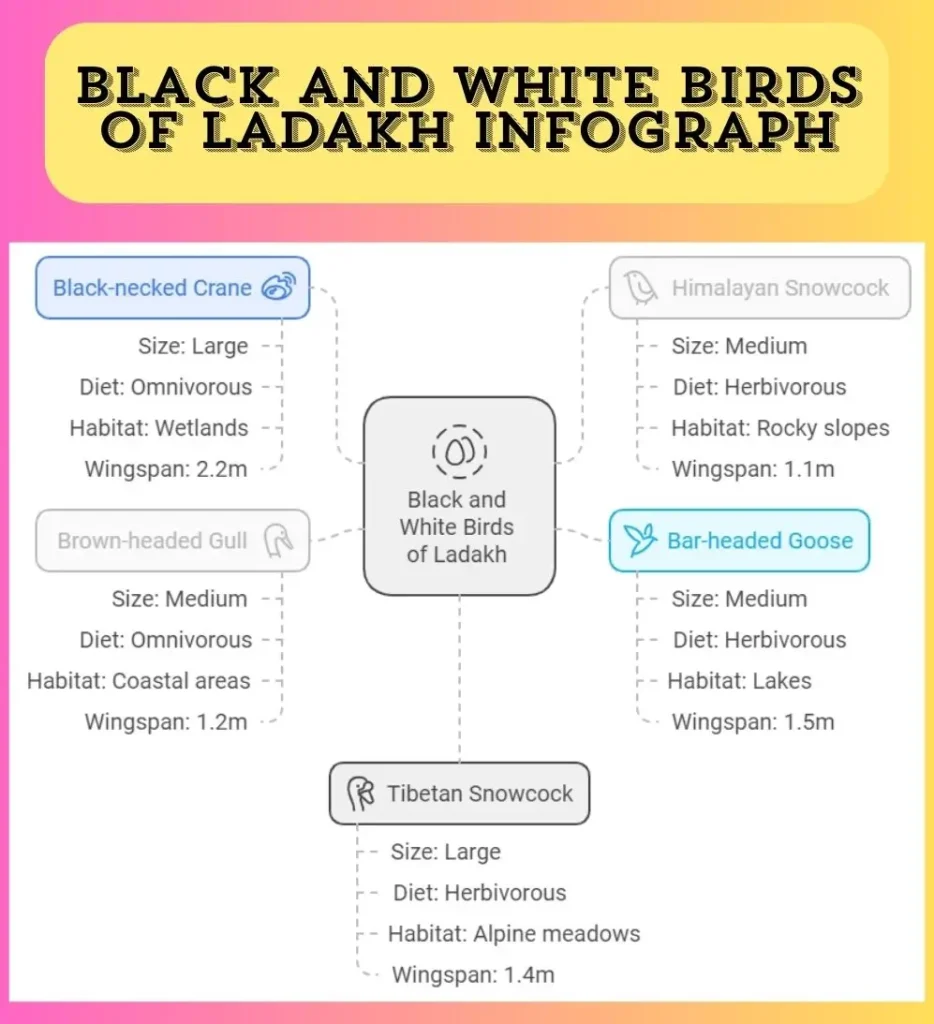
These birds have different color patterns black and white and also have different diets, habitats, and characteristics.
Here is the list:
- black-necked crane
- Himalayan snowcock
- bar-headed goose
- brown-headed gull
- Tibetan snowcock
Let’s explore these birds.
Black-necked Crane:
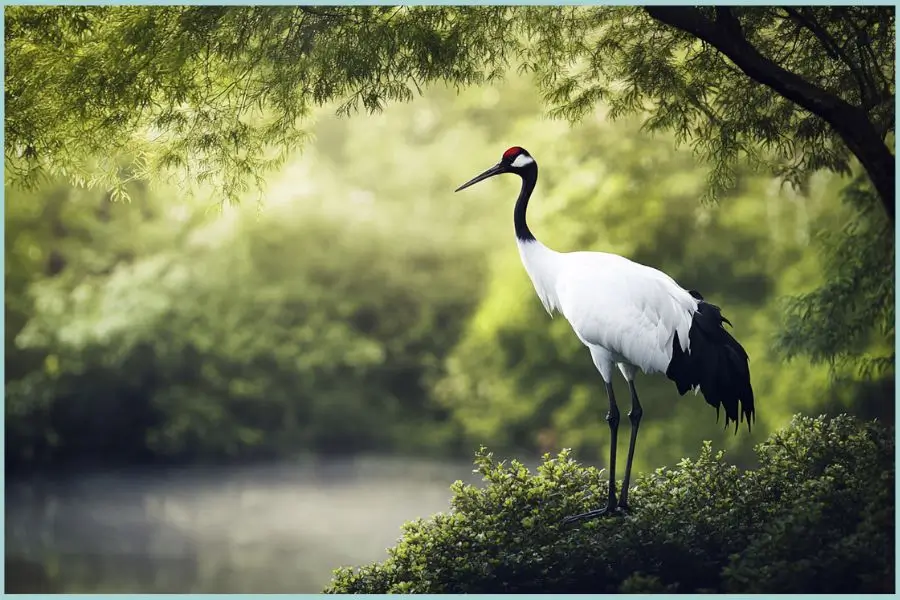
The black-necked Cranes are medium-sized black and white birds of Ladakh.
This crane breeds on the Tibetan Plateau, other parts of India, and Bhutan.
Key Facts:
- Size: Up to 139 cm long
- Wingspan: 235 cm
- Weight: 5 to 5.5 kg
- Distinctive features: Black head, red crown patch
- Conservation status: Endangered
They can grow up to 139cm long with a wingspan of 235cm (Wikipedia), and weigh between 5 to 5.5 kg.
They have black heads, tails, and legs. Also, they have gray and whitish bodies and red crown patches.
The black-necked Crane is an Endangered animal.
Learn more about Black-necked Crane conservation efforts from the International Crane Foundation
Himalayan Snowcock:
The Himalayan snowcock belongs to the pheasant family primarily found in the Himalayan ranges and parts of the Pamir range of Asia.
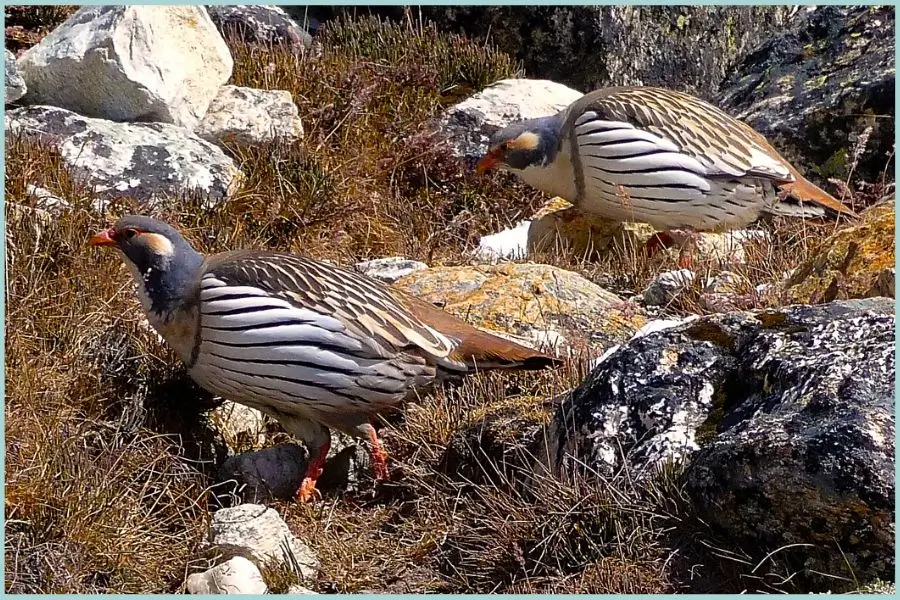
They live on rocky slopes at almost 4,500m. They can grow up to 54-72 cm with a wingspan of 85-97 cm, weighing 2-3.5 kg.
They mostly eat grasses, leaves, fruits, berries, etc.
Key Facts:
- Size: 54-72 cm long
- Wingspan: 85-97 cm
- Weight: 2-3.5 kg
- Diet: Grasses, leaves, fruits, berries
- Where to spot: Hemis National Park, Suru, Drass, Zanskar
In Ladakh, they can be found in Hemis National Park, Suru, Drass, Zanskar, etc.
Explore Hemis National Park’s wildlife on the official Ladakh Tourism website
Bar-headed Goose:
The bar-headed goose is found in the Himalayas and Central Asia. They known as Ngangpa in Ladakh.
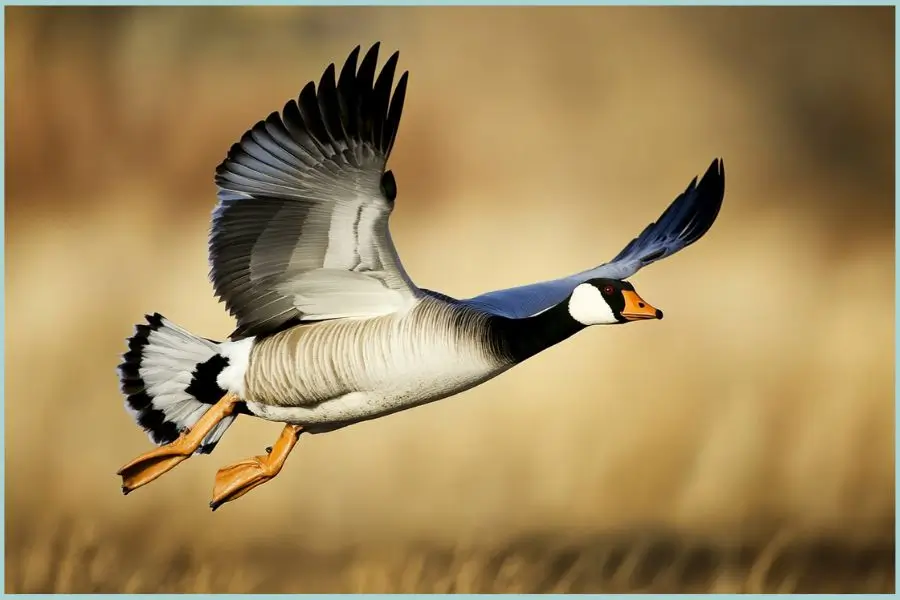
They can grow up to 68-78 cm in length with a wingspan between 140 to 160 cm. They prefer to stay at altitudes up to 4000-6000m.
The bar-headed goose has orange legs and black bars on the white head, that’s why they named it.
They mainly eat grasses, grains, fish, and insects.
In Ladakh, you easily found this goose in the Wetlands of the Changthang region.
Key Facts:
- Size: 68-78 cm long
- Wingspan: 140-160 cm
- Preferred altitude: 4000-6000m
- Local name: Ngangpa
- Diet: Grasses, grains, fish, insects
- Best spot: Wetlands of Changthang region
Read about Bar-headed Geese migration on WWF
Brown-headed Gull
The brown-headed gulls are black and white birds in Ladakh. This bird breeds in the Wetlands of the Changthang region.
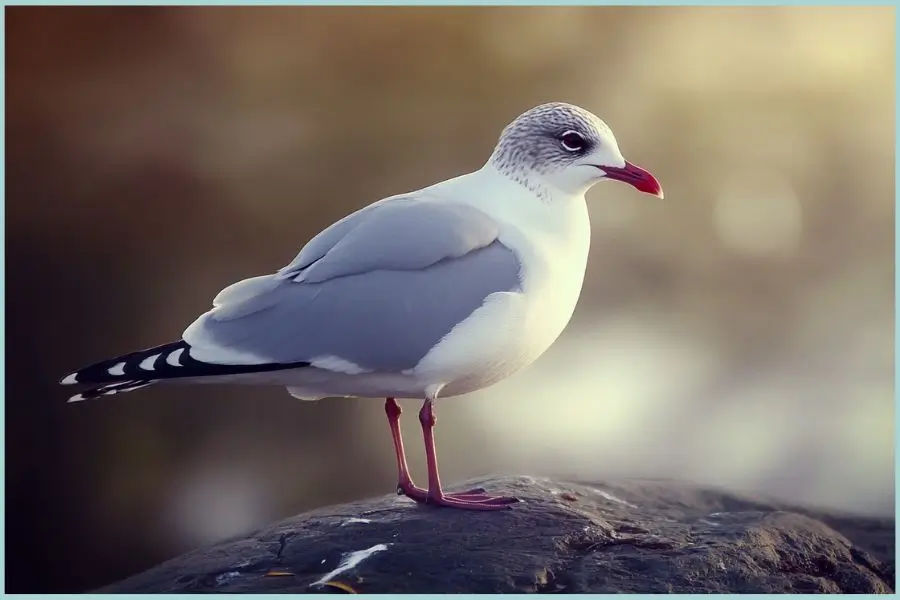
They can grow up to 40-45 cm in length, and weigh between 450-700g. They can live up to 11 years.
They mostly eat fish and invertebrates.
In Ladakh, you can easily find these birds in the Wetlands of the Changthang region and the Upper Indus Valley.
Key Facts:
- Size: 40-45 cm long
- Weight: 450-700g
- Lifespan: Up to 11 years
- Diet: Fish and invertebrates
- Where to find: Changthang wetlands, Upper Indus Valley
Tibetan Snowcock:
The Tibetan Snowcock is a white and black snowbird found at altitudes between 3,700m to 5,700m.
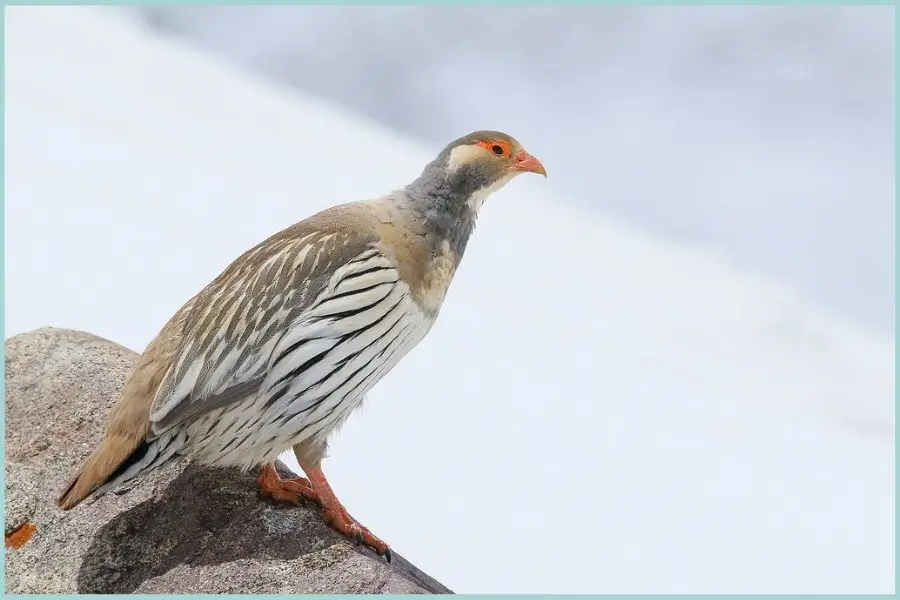
They can grow up to 50-56 cm and weigh between 1 to 1.6 kg both male and female.
They have white, gray, and black bodies with red bills. You can easily identify males by the spurs on the legs.
They mostly eat roots, leaves, fruits, berries, seeds, etc. In Ladakh, they are found in high mountains.
Key Facts:
- Size: 50-56 cm long
- Weight: 1 to 1.6 kg
- Altitude range: 3,700m to 5,700m
- Distinctive features: Red bill, spurs on male legs
- Diet: Roots, leaves, fruits, berries, seeds
Best Times to Spot Birds of Ladakh
- Spring (April-May): Migration season
- Summer (June-August): Breeding season
- Early morning and late afternoon: Most active times
Birdwatching Tips for Ladakh
- Bring warm clothes
- Use binoculars
- Stay quiet
- Respect bird habitats
- Join a guided tour
Find reputable Ladakh tour operators on Responsible Travel
Conservation Efforts for Birds of Ladakh
Many birds of Ladakh face threats from climate change and habitat loss. Local organizations work to protect these species:
- Wildlife Protection Department of Ladakh
- WWF-India Ladakh Program
- Ladakh Ecological Development Group
Support bird conservation through the Bombay Natural History Society
Comparison of Ladakh’s Black and White Birds:
| Bird Species | Size (cm) | Wingspan (cm) | Weight (kg) | Diet | Habitat |
| Black-necked Crane | 139 | 235 | 5-5.5 | Omnivore | Wetlands |
| Himalayan Snowcock | 54-72 | 85-97 | 2-3.5 | Herbivore | Rocky slopes |
| Bar-headed Goose | 68-78 | 140-160 | Not provided | Omnivore | Wetlands |
| Brown-headed Gull | 40-45 | Not provided | 0.45-0.7 | Fish, invertebrates | Wetlands |
| Tibetan Snowcock | 50-56 | Not provided | 1-1.6 | Herbivore | High mountains |
FAQs (Frequently Asked Questions):
-
What is the best time to see birds in Ladakh?
The best time to see birds in Ladakh is during spring (April-May) for migration and summer (June-August) for breeding season.
-
Are there any endangered birds in Ladakh?
Yes, the Black-necked Crane found in Ladakh is classified as an Endangered species.
-
What equipment do I need for birdwatching in Ladakh?
Essential equipment includes binoculars, a field guide, warm clothing, and a camera for documenting your sightings.
-
Can I go birdwatching on my own in Ladakh?
While possible, it’s recommended to join a guided tour for safety and to benefit from local expertise in spotting and identifying birds.
Conclusion:
Ladakh has various bird species like the Indian Roller, Red-vented Bulbul, and Oriental Magpie Robin, each with a unique diet and habitat. It’s an excellent destination for birdwatchers and nature lovers.

